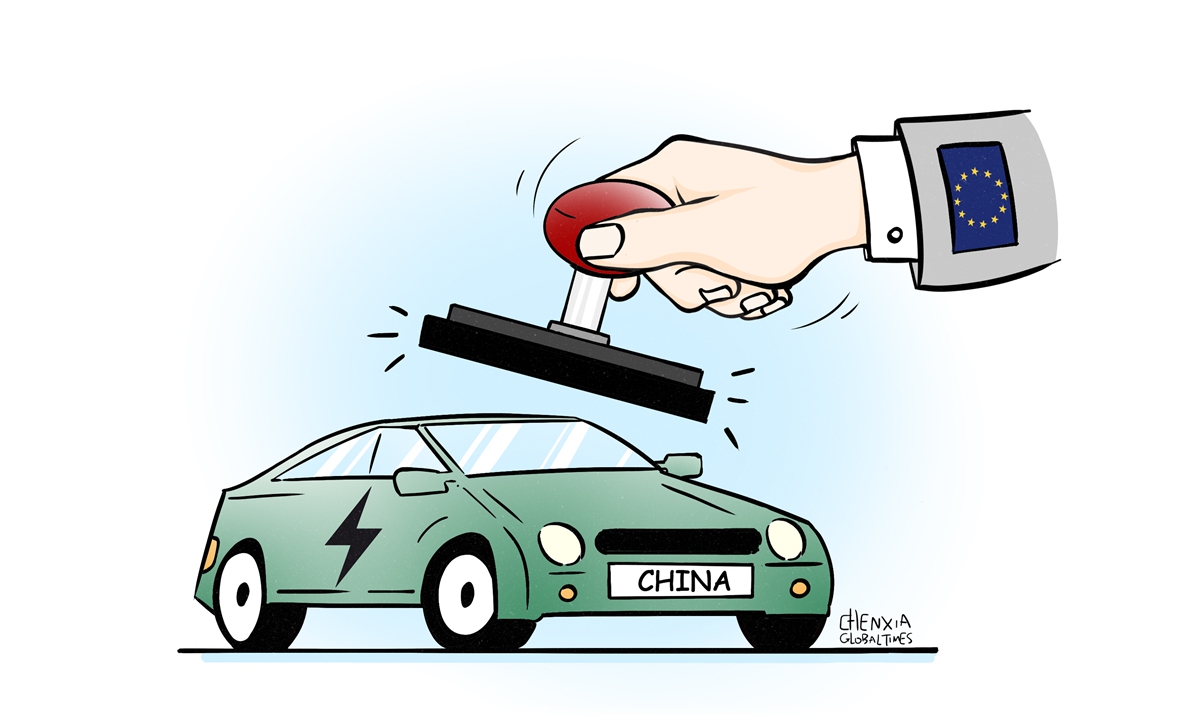
Illustration: Chen Xia/Global Times
Latest news reports from Western media suggest that the European Commission has put on hold the announcement of its decision on Chinese electric vehicles (EVs) for a few more days. The main executive body of the EU was reportedly expected to announce potential tariffs on Chinese EVs by Wednesday, but that did not happen despite days of media speculation and build-up. Though the commission is still expected to make public its findings from the probe and potential moves reportedly on June 10, the postponement offers just a few days to reflect on where things stand and the profound implications.
Starting with the postponement, there has not been any official statements from the EU, but Western media reports suggest that the decision was made so as to the keep the issue out of the European Parliament election, which runs from June 6 to 9. However, Chinese experts said the delay sends a list of signals. On top of that list is the sign that there remain fundamental divisions within the EU over the potential EV tariff hike. It also shows that the move has become so unpopular and opposed that certain EU leaders do not want any decision to affect their chance of being reelected.
Indeed, the European Commission's decision to investigate Chinese EVs faced strong opposition from the outset. Even before European Commission President Ursula von der Leyen announced the probe in September 2023, the plan had already drawn criticism from leaders of EU member states, including German Chancellor Olaf Scholz, who said a week before the September announcement that "competition should spur us on, not scare us." The European Commission's justification for the probe is that the EU market has been "flooded" by Chinese EVs set at "artificially low" prices.
The criticism from within the EU continues to grow stronger, especially as the European Commission is expected to conclude the probe and announce tariffs. The criticism has grown so strong that there have been very few prominent figures publicly expressing support for the measures, outside of US officials. In fact, the opposition from leaders of EU member states and EU industries has grown louder. Many of them disagreed with the EU's protectionist approach and are worried that such an approach would lead to a trade war with China, one of the largest trading partners for the EU. Swedish Prime Minister Ulf Kristersson, for example, said on May 14 that "a wider trade war where we block each other's products is not the way to go."
Such concerns are not without reasonable justification. While the phase "trade war" might be over the top, countermeasures from China are a certainty. Chinese officials have repeatedly made clear that if the European Commission takes measures that harm Chinese interests, China will take all necessary measures to defend its interests. It would be a grave mistake and extremely dangerous for some in the EU to underestimate China's resolve to defend its interests. If there is any question about whether China will respond and how it will respond, one can look at how China responded to the US-initiated trade war with China over the past several years. China will not escalate the situation, but make no mistake, its response will be sufficient and felt by the EU side.
That begs the question as to why the European Commission moves forward such an unpopular and dangerous step that lacks any factual and legal basis. First, it is true that Chinese EVs have gained much global market share in recent years, which has posed serious competition for carmakers in the EU and elsewhere. However, as many have pointed out, competition is good for consumers and for the global auto industry, and is not the basis for protectionist actions. Still, it's clear that some EU politicians want to exploit the anxiety about competition from China, as well as rising hostility toward China in some EU quarters, for political gains. There is also the pressure from the US, which has been relentlessly pressuring the EU to follow its suit of imposing tariffs on Chinese EVs.
It is clear that certain European Commission leaders are essentially making the move for personal political gains and praise from US politicians against the will of the EU industry that it claims to protect, while risking starting a trade war with China that could lead to considerable losses for EU businesses and consumers. This is the true nature of the European Commission's move against Chinese EVs, and all parties in the EU and the broader international community must be clear-eyed about this reality. If a wide trade conflict breaks out, the blame lies entirely with European Commission leadership.
As for the legitimate concerns of some EU officials and industries who are earnestly seeking to improve China-EU bilateral ties and strengthen win-win cooperation with China, they, along with the international community, should know that China is open to dialogue and consultation to address their concerns, as long as talks are based on facts, reason and mutual respect. Chinese officials have made that abundantly clear. More recently, Chinese Commerce Minister Wang Wentao said in Spain on June 1 that China hopes to properly handle economic trade frictions between China and the EU through dialogue and consultation. Clearly, there is plenty of sincerity from the Chinese side in addressing reasonable trade disputes and stabilizing China-EU economic and trade cooperation.
With just days left as the European Commission is widely expected to announce its decision on Chinese EVs, the ball is in the EU's court to avoid a potentially bruising trade row. Finally, for certain EU leaders, here is a Chinese idiom that has been often used in serious warnings in consequential diplomatic matters: Do not blame us for not having forewarned you.
The author is a reporter with the Global Times. bizopinion@globaltimes.com.cn



